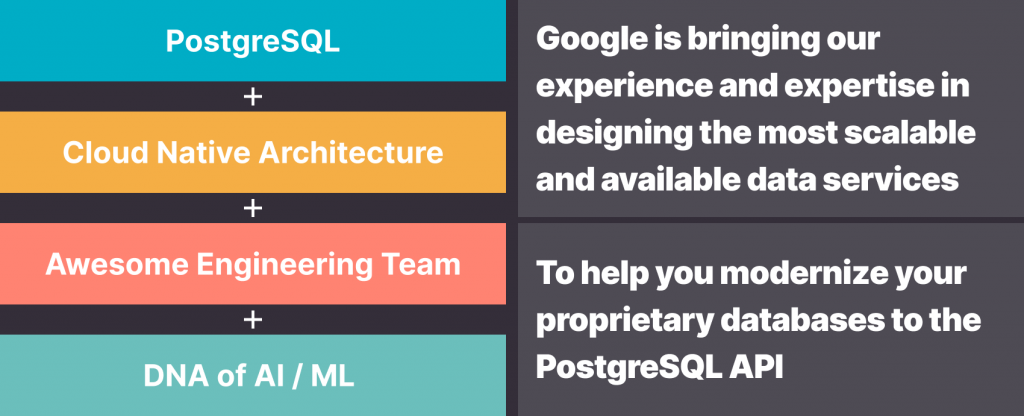The first blog in this series provided a brief overview of AlloyDB Omni. In this blog, we will go into more details about what AlloyDB Omni is, why you should use it, and who can benefit the most from it. But before we begin let’s learn a little about PostgreSQL.PostgreSQL is a stable, open-source relational database that supports SQL and JSON queries. It’s used by many web, mobile, and analytics applications. PostgreSQL is extremely stable, with over 20 years of community development contributing to its high levels of resilience, integrity, and accuracy.
AlloyDB Omni is not just a faster version of PostgreSQL it offers a few more features over it. Let’s learn about those features.
What does AlloyDB Omni offer?
- Fully compatible with PostgreSQL: AlloyDB Omni is a drop-in replacement for PostgreSQL, so you can easily migrate your existing applications without any changes.
- Columnar Engine: The columnar engine can accelerate complex queries by caching data from selected columns in memory and then applying this cache to appropriate queries.
- Index Advisor: The index advisor helps to eliminate the guesswork involved in optimizing query performance by performing a thorough analysis of the various components of a query, including subqueries, joins, and filters.
- Adaptive Auto Vacuum of Stale data: Autovacuum ensures a reliable and consistent application transactional performance and maintains high availability of the system by preventing transaction ID wraparound.

PGVector in AlloyDB for PostgreSQL
In June 2023, Google announced that AlloyDB for PostgreSQL now supports the PGVector extension, allowing users to use AlloyDB to store and query vectors for their AI and machine learning applications.
With vector support built directly into AlloyDB databases, you can create AI-enabled experiences that are aware of the application and user state. In addition to basic vector support, AlloyDB provides:
- Enterprise-grade serving stacks: AlloyDB Omni provides enterprise-grade PostgreSQL with enterprise support from Google, running in your infrastructure, including guides and support for implementing high availability and disaster recovery for your AlloyDB Omni databases.
- Tight integration with operational data: We believe the best AI-enabled experiences will be deeply integrated with the application, leveraging real-time transactional data to enhance user experiences. AlloyDB Omni makes that possible by embedding AI directly into your operational database, supporting powerful queries across structured and unstructured operational data, and combining vector predicates with standard PostgreSQL filters.
Integrating with Vertex AI
AlloyDB Omni’s vector support is particularly powerful when paired with generative AI services on Vertex AI, including pre-trained foundational and embedding models across text and images. With AlloyDB Omni, you can call custom Vertex AI models directly from the database, for high-throughput, low-latency augmented transactions. Together, these provide a toolkit to integrate large language models into applications.
Who should use AlloyDB Omni?
AlloyDB Omni is a good choice for organizations that need a powerful, scalable, and cost-effective database service for various workloads. Especially for the organizations whose workloads are restricted to on-premises datacenters due to data regulatory requirements.
Here are some of the organizations that should consider using AlloyDB Omni:
- Organizations that need to migrate their existing PostgreSQL workloads to the cloud but can’t: AlloyDB Omni is fully compatible with PostgreSQL, so existing applications will run unchanged when migrated to AlloyDB Omni. This makes it a great option for organizations that want to migrate their existing PostgreSQL workloads to enterprise-grade PostgreSQL but can’t move to AlloyDB for PostgreSQL in the cloud due to regulatory/governance reasons.
- Organizations that need a database service for high-performance transactional workloads: AlloyDB Omni is more than 2x faster than standard PostgreSQL for transactional workloads. This makes it an excellent choice for applications that require high performance for online transactions, such as e-commerce websites and customer relationship management (CRM) systems.
- Organizations that need a database service that is easy to use and manage: AlloyDB Omni is easy to use and control. Users can get started with AlloyDB Omni in minutes, and you don’t need to be a database administrator to use it.
Why should customers opt for AlloyDB Omni?
Here are some additional considerations that may help you decide which database service is right for you:
- Ease of use: Due to its similarity to PostgreSQL databases, AlloyDB Omni can easily be managed by users who have experience in PostgreSQL. Even if a user does not have a lot of experience in managing PostgreSQL, it can be handled very easily using the built-in AlloyDB Omni CLI.
- Control: AlloyDB Omni gives you more control over your database environment. You can choose your hardware and software and manage your database servers yourself. This can be a good option for customers with specific requirements or who want to avoid vendor lock-in.
- Portability: AlloyDB Omni can be run on-premises or on any cloud platform. This gives you the flexibility to move your database to a different environment if your needs change.
- Scalability and Availability: AlloyDB Omni customers can create an AlloyDB Omni replica instance based on the workload to act as a read replica for an existing AlloyDB Omni instance, thus ensuring a highly available system for their workloads.
Conclusion
AlloyDB Omni is a high-performance PostgreSQL-compatible database engine with all-inclusive analytics platform. AlloyDB managed services will assist customers in bridging the gap between the higher-end legacy database environments that they are running on-premises and the capabilities of open source. With AlloyDB Omni, organizations can now take control of their Cloud Journey by utilizing cutting-edge tools to modernize their legacy databases in-house. This empowers them to stay ahead of the curve and ensure their databases remain up to date with the latest advancements in technology. By using AlloyDB Omni, organizations can achieve greater efficiency and productivity without the need for costly outsourcing or external assistance.
So why wait? Join the future of database management and download your free developer edition of AlloyDB Omni today at https://cloud.google.com/alloydb/omni. Your databases (and your IT team) will thank you!






